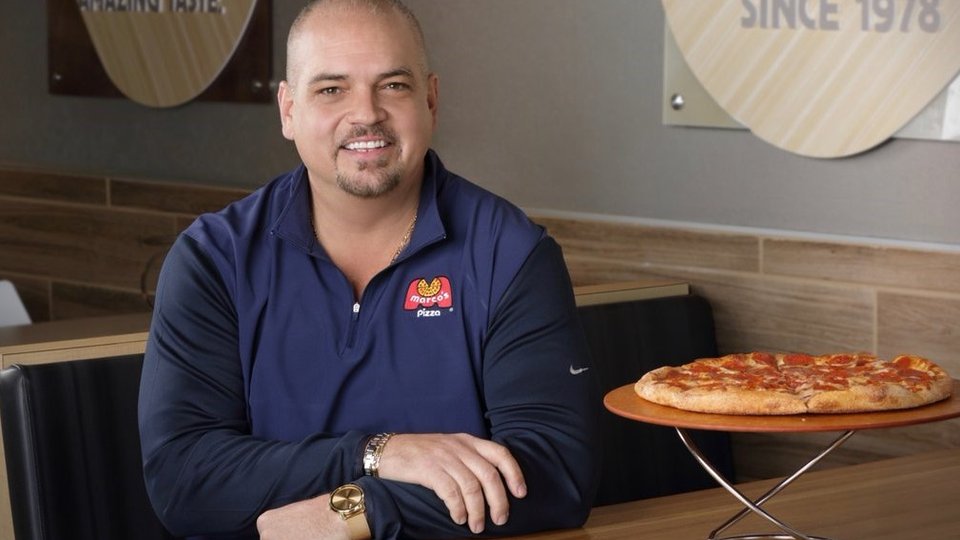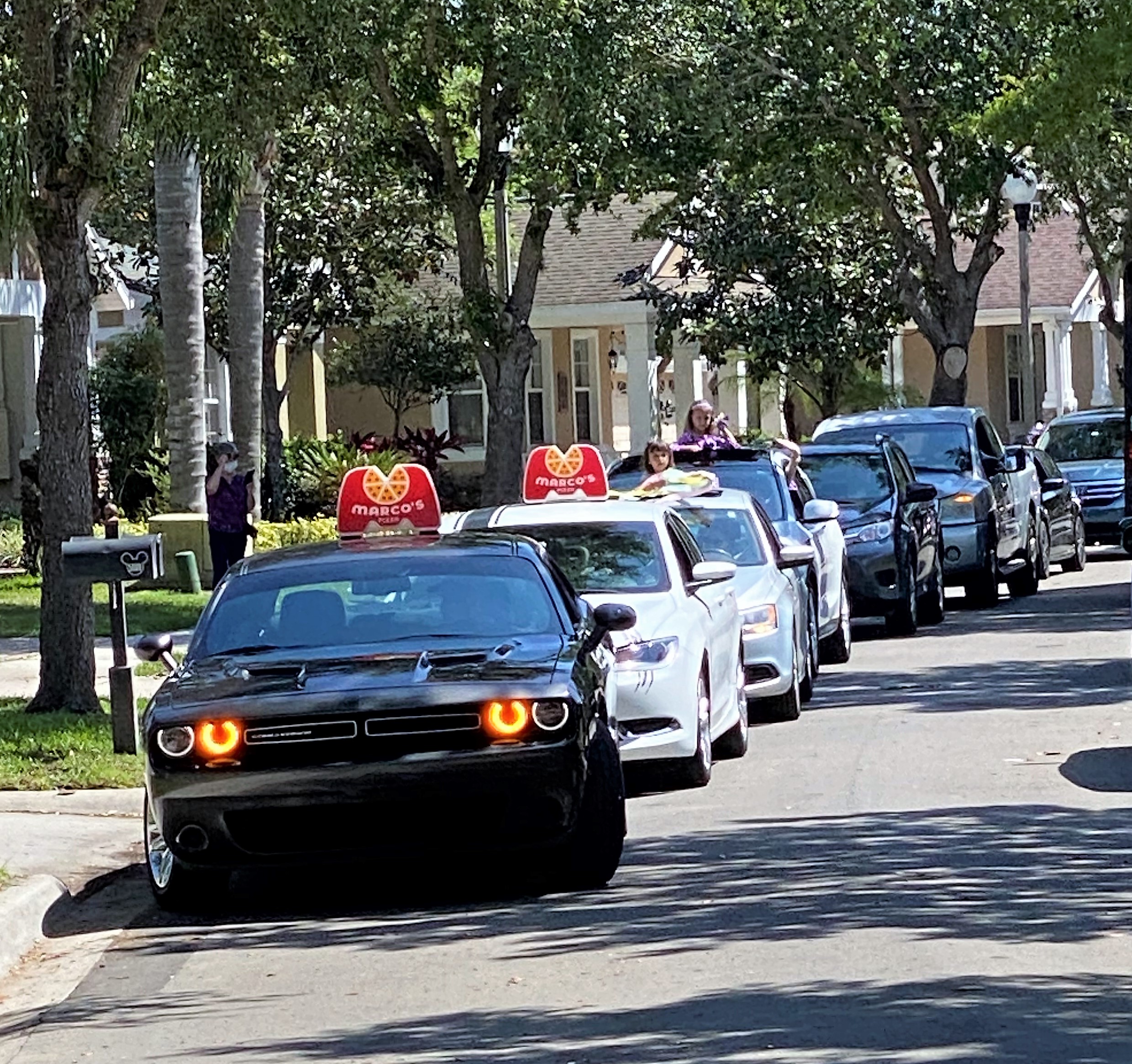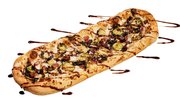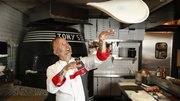1-on-1 with Pizza Leadership
Marco's Pizza president mulls what stays, what goes in restaurant world's 'new reality'
In a pandemic-ridden restaurant world, people will be keenly aware of what they touch and how close they are situated to others. Those are just two reasons Marco's Pizza President and COO Tony Libardi says his brand is morphing to meet the future.

May 13, 2020 by S.A. Whitehead — Food Editor, Net World Media Group
DELCO – the restaurant acronym for "DELivery and CarryOut," has taken on something of a halo on today's pandemic-ridden restaurant landscape. After all, restaurant delivery and carryout have almost single-handedly saved QSRs from the
 |
| Pizza delivery in a pandemic-rattled world.(Photo: Marco's Pizza) |
brutal assault COVID-19 has had on sales.
For the mostly "DELCO" pizza brand, Marco's Pizza (operated by Marco's Franchising, LLC), that is particularly the case, since over the course of the last few months of vastly altered business operations, the brand's leadership said delivery and carryout have saved its business across the 34 U.S. states where it operates.
In fact, Marco's Pizza President and COO Tony Libardi said the brand has seen some actual record-setting sales weeks right in the middle of the pandemic's stay-at-home orders that forced brands to modify to survive. Marco's stores were well-positioned since all but about 100 of the brand's 900-plus locations, operate without any dine-in presence.
"We've seen multiple record-setting weeks, and I'm not talking by small amounts," Libardi said in an interview with Pizza Marketplace. "I mean, we have done very, very well as a brand overall, through this crisis."
In large part, Libardi credits franchisees' connectedness with their surrounding communities for seeing the brand through the crisis thus far with flying colors. In fact, one operator in Ocala, Florida actually organized a birthday parade for a little girl who had to cancel her eighth birthday party at Marco's because of the pandemic.
"And so the operator organized a parade by this young lady's house with first responders … and workers and … the cars were going by beeping and wishing her happy birthday," Libardi recalled. "And she sat in her garage under … a little pop-up tent eating a Marco's pizza, and I think it's something that little girl will remember forever."
"There's a trust thing, right? None of them are just, 'Open the doors and go.' But we've seen some modified openings in terms of capacity … and we've even done some limiting of menu offers just to kind of ease back into this."
-Tony Libardi
But that kind of response didn't happen without a lot of work by the franchisee many months and years earlier to establish the kind of community ties that allowed him to rally the troops (in this case fire and EMS workers that participated in the parade) to make one little girl's very special day even more so, when it counted.
Gain, retain, amplify trust: Keys to keeping dine-in
In a similar way, Libardi said now is the time his brand is preparing and planning the actions they need to make to thrive in the new reality brought on by COVID-19. And in that respect, again, Libardi said a lot of it is about continuing to gain, retain and amplify the community's trust in the brand.
For instance, that need is one reason the company is proceeding very slowly in bringing its dine-in properties back for modified operations.
 |
| An Ocala, Florida Marco's franchisee organized this birthday parade by an 8-year-old's house as a surprise when her party at the restaurant had to be cancelled due to COVID-19.(Photo: Marco's) |
"There's a trust thing, right?" he said, referring to the overall caginess many customers have about heading back out for a meal in an actual restaurant. "None of them are just open the doors and go, but we've seen some modified openings in terms of capacity … and we've even done some limiting of menu offers just to kind of ease back into this."
Kind of like the getting back on the proverbial horse after a fall, Libardi said early reports suggest that customers are equally skittish about going "full-on" dine-in again. So as customers proceed very slowly and cautiously, restaurant operators are echoing that in their operations.
At Marco's that means very visible, frequent and copious amounts of sanitizing and cleaning, as well as lots of patience about letting customers, like operators, take the time required to return to what ever kind of normal the future will bring.
This kind of measured approach is backed up by the most recent restaurant data from NPD Group, which found that though dine-in restrictions have been lifted for nearly 192,000 U.S. restaurant units (about 29% of total units) since May 1, only about 30% of the potential volume was realized according to transactions, even with the reduced capacity limits in effect due to the pandemic. ((LINK HERE))
The value of listening in a pandemic-weary world
In this restaurant business landscape, Libardi said it is more essential than ever before for brands to actively listen to what customers are talking about, whether that be in person, via social media and websites, via online data, the phone and any other area where brand meets public.
Then, Libardi said, it's about staying flexible.
 |
| Masks and gloves are just the beginning of pizza brand adjustments to the new reality of the restaurant world.(Photo: Marco's) |
"Listen, learn, adapt to what your consumers are saying because … I think there will be some policies and procedures and things that we can do systemwide, but I think there's going to be some uniqueness," Libardi said, referring to the individual characteristics of each community where stores are located. "Somebody that is living in Miami, Manhattan or some other of these municipalities that have been just devastated by the disease, are going to have different requirements based on what that consumer needs, compared to someone in a place that hasn't experienced a whole lot of the disease."
That's why this pizza brand has put such an emphasis on having leadership think about themselves as "everyday people," and the kinds of things they do, need and want outside of work. For instance, Libardi said he and his family — like most other Americans — have now become acutely aware of how close they are situated to other people, as well as having vastly heightened sensitivity about the things they touch or touch them.
Our states of mind, he said, have forever changed and restaurants that realize and respond to that change will be – in his view – the ones that prevail. So the kinds of questions Libardi and Marco's leadership are asking now include everything from, "What kind of physical interfaces (door knob, push-bar, etc.) do restaurant doors have with customers and how do we make that safe?" and "How can we move away from physically handing customers receipts?", to "How do you greet customers from 6 feet away?" and "What do we do about table condiments and dine-in spacing and separation?"
The array of possible responses to those types of questions then trigger new questions about things like overall restaurant square-footage needs, open kitchen formats, and even employee uniform cleaning standards, disposable tableware use and installation of drive-up or walk-up portals to the brand.
In fact, a particular stumper for many brands, including Marco's, moving forward, revolves around the customer experience and the many ways brands have physically connected with customers in the past. Now, in a time when acrylic screens, face masks and plastic gloves have all become standard, how do brand still engender the kind of great customer connection successful brands must have, Libardi asked.
"We've seen multiple record-setting weeks, and I'm not talking by small amounts. I mean, we have done very, very well as a brand overall, through this crisis."
-Tony Libardi
"You don't want to feel like fortresses and have people feel that disconnect, because people still need to feel those, emotional connections as well as the experiential side of the equation," he explained, adding that Marco's is increasingly looking at technology to help here and even just opened its first virtual kitchen store in Hollywood, California.
And those less customer-interactive models might mean different types of employees will be newly prized in the industry over the more extraverted ideals so coveted pre-pandemic. Ultimately though, it still all goes back to the kind of trust and confidence in brand that still comes with some form of community connection.
It's still to be determined just how brands will accomplish that feat even as they use more automation and things like virtual kitchens. But as one 8-year-old Ocala, Florida girl will tell you, the need for those kinds of customer impressions may be changing, but it's not going anywhere.
"There are so many little moments and little memories that are being created right now that may become that new future," Libardi said. "We're uniquely positioned to be in those special memory moments. And we just have to figure out how do we continue to be in them and more quickly be in them in the new paradigm that keeps people safe."
About S.A. Whitehead
Pizza Marketplace and QSRweb editor Shelly Whitehead is a former newspaper and TV reporter with an affinity for telling stories about the people and innovative thinking behind great brands.
 ChatGPT
ChatGPT Grok
Grok Perplexity
Perplexity Claude
Claude








